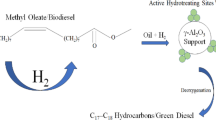Abstract
Catalytic biodiesel production with bases can be achieved under relatively mild conditions. However, the basicity of solid alkali catalysts originates usually from electron-rich atoms such as oxygen and nitrogen, rather than electron-deficient metal species. This typically induces aggregation and leaching of active sites, and difficulty in recycling. Here we synthesized a photothermal catalyst made of stable and uniformly dispersed graphene-like biomaterial anchored neighboring potassium single atoms. The production of biodiesel from various acidic oils over this catalyst was evaluated by life cycle assessment and cost analysis. Infrared thermal imaging and finite element simulations were used to study the light-induced self-heating process. We further studied the alkaline behavior of neighboring potassium single atoms by carbon dioxide chemisorption and quantum calculations. Results show biodiesel yield of 99.6% at room temperature, which is explained by a good local photothermal effect at the solar interface and the presence of superalkali sites in the atomic potassium-containing biomaterial. The global warming potential measured for this system resulted in a net negative CO2 emission of −10.8 kg CO2eq/kg. The photothermal catalyst can be recycled with almost no decline in reactivity.




Similar content being viewed by others
References
Anand U, Dey S, Parial D, Federici S et al (2023) Algae and bacteria consortia for wastewater decontamination and transformation into biodiesel, bioethanol, biohydrogen, biofertilizers and animal feed: a review. Environ Chem Lett 21:1585–1609. https://doi.org/10.1007/s10311-023-01562-w
Corro G, Sánchez N, Pal U, Cebada S et al (2017) Solar-irradiation driven biodiesel production using Cr/SiO2 photocatalyst exploiting cooperative interaction between Cr6+ and Cr3+ moieties. Appl Catal B-Environ 203:43–52. https://doi.org/10.1016/j.apcatb.2016.10.005
Dutta N, Usman M, Ashraf MA, Luo G et al (2023) Methods to convert lignocellulosic waste into biohydrogen, biogas, bioethanol, biodiesel and value-added chemicals: a review. Environ Chem Lett 21:803–820. https://doi.org/10.1007/s10311-022-01511-z
Gautam A, Khajone VB, Bhagat PR, Kumar S et al (2023) Metal- and ionic liquid-based photocatalysts for biodiesel production: a review. Environ Chem Lett 21:3105–3126. https://doi.org/10.1007/s10311-023-01637-8
Huang JS, Jian YM, Zhu P, Abdelaziz O et al (2022) Research progress on the photo-driven catalytic production of biodiesel. Front Chem 10:904251. https://doi.org/10.3389/fchem.2022.904251
Liang S, Xu M, Zhang T (2013) Life cycle assessment of biodiesel production in China. Bioresour Technol 129:72–77. https://doi.org/10.1016/j.biortech.2012.11.037
Marwaha A, Dhir A, Mahla SK, Mohapatra SK (2018) An overview of solid base heterogeneous catalysts for biodiesel production. Catal Rev 60:594–628. https://doi.org/10.1080/01614940.2018.1494782
Mukhopadhyay P, Chakraborty R, Singh S (2022) Triacetin additive in biodiesel to reduce air pollution: a review. Environ Chem Lett 20:1193–1224. https://doi.org/10.1007/s10311-021-01362-0
Osman A, Lai ZY, Farghali M, Yiin CL et al (2023) Optimizing biomass pathways to bioenergy and biochar application in electricity generation, biodiesel production, and biohydrogen production. Environ Chem Lett 21:2639–2705. https://doi.org/10.1007/s10311-023-01613-2
Peng SS, Shao XB, Gu MX et al (2022) Catalytically stable potassium single-atom solid superbases. Ange Chem Int Ed 61:e202215157. https://doi.org/10.1002/anie.202215157
Ruatpuia JVL, Halder G, Mohan S, Gurunathan B et al (2023) Microwave-assisted biodiesel production using ZIF-8 MOF-derived nanocatalyst: a process optimization, kinetics, thermodynamics and life cycle cost analysis. Energ Conver Manage 292:117418. https://doi.org/10.1016/j.enconman.2023.117418
Song CQ, Wang ZH, Yin Z, Xiao DQ et al (2022) Principles and applications of photothermal catalysis. Chem Catal 2:52–83. https://doi.org/10.1016/j.checat.2021.10.005
Stephenson AL, von Blottnitz H, Brent AC, Dennis JS et al (2010) Global warming potential and fossil-energy requirements of biodiesel production scenarios in South Africa. Energy Fuels 24:2489–2499. https://doi.org/10.1021/ef100051g
Theerthagiri J, Lee SJ, Karuppasamy K, Arulmani S et al (2021) Application of advanced materials in sonophotocatalytic processes for the remediation of environmental pollutants. J Hazard Mater 412:125245. https://doi.org/10.1016/j.jhazmat.2021.125245
Theerthagiri J, Park J, Das HT, Rahamathulla N et al (2022) Electrocatalytic conversion of nitrate waste into ammonia: a review. Environ Chem Lett 20:2929–2949. https://doi.org/10.1007/s10311-022-01469-y
Wang H, Li JM, Li K, Lin YP et al (2021) Transition metal nitrides for electrochemical energy applications. Chem Soc Rev 50:1354–1390. https://doi.org/10.1039/D0CS00415D
Wang BY, Li MR, Zhang SD, Wu HG et al (2023) Synergistic effect between Co single atoms and nanoparticles enables selective synthesis of bio-based benzimidazoles. Appl Catal B-Environ 327:122454. https://doi.org/10.1016/j.apcatb.2023.122454
Yu Y, Min A, Jung HJ, Theerthagiri J et al (2021) Method development and mechanistic study on direct pulsed laser irradiation process for highly effective dechlorination of persistent organic pollutants. Environ Pollut 291:118158. https://doi.org/10.1016/j.envpol.2021.118158
Funding
Study supported by Guizhou Provincial Science and Technology Project (GCC[2023]011, ZK[2022]011), National Natural Science Foundation of China (22368014), and Guizhou Provincial Higher Education Institution Program (Qianjiaoji[2023]082).
Author information
Authors and Affiliations
Contributions
The manuscript was written through contributions of all authors.
Corresponding authors
Ethics declarations
Conflict of interest
The authors have no competing interests to declare.
Data availability
Data available upon request.
Additional information
Publisher's Note
Springer Nature remains neutral with regard to jurisdictional claims in published maps and institutional affiliations.
Supplementary Information
Below is the link to the electronic supplementary material.
Rights and permissions
Springer Nature or its licensor (e.g. a society or other partner) holds exclusive rights to this article under a publishing agreement with the author(s) or other rightsholder(s); author self-archiving of the accepted manuscript version of this article is solely governed by the terms of such publishing agreement and applicable law.
About this article
Cite this article
Huang, J., Liu, T., Wang, K. et al. Room-temperature and carbon-negative production of biodiesel via synergy of geminal-atom and photothermal catalysis. Environ Chem Lett (2024). https://doi.org/10.1007/s10311-024-01723-5
Received:
Accepted:
Published:
DOI: https://doi.org/10.1007/s10311-024-01723-5




